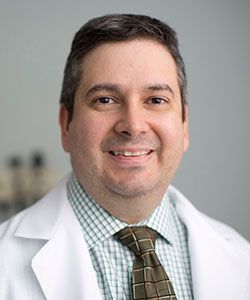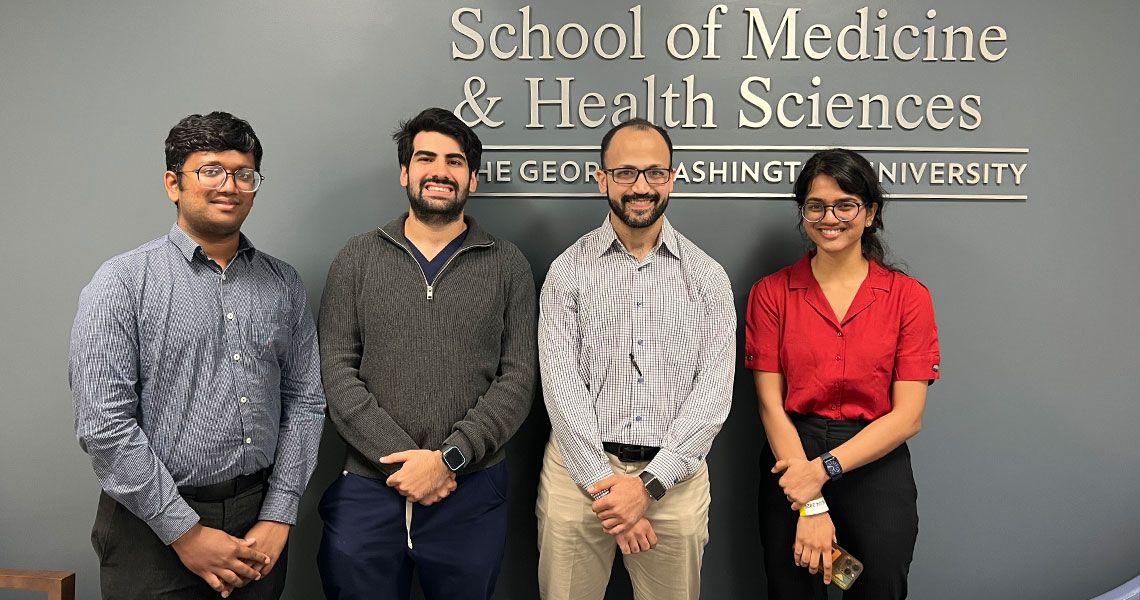Since its launch in 2012, the Medical Research Fellowship Program (MRFP) — the flagship initiative of the Office of International Medicine Programs (IMP) — has supported nearly 200 international medical graduates (IMGs) in their pursuit of U.S. residency placements. The MRFP offers fellows a unique, multidisciplinary experience that includes research training, clinical observation, professional development, and residency application preparation, all made possible through individualized mentorship by GW SMHS faculty members.
IMP offers both 6- and 12-month programs, with opportunities for extension. Cohorts typically average 14 research fellows; the current cohort includes eight participants.
Depending on the program's duration, research fellows typically complete between two and six scholarly publications. Former fellows have been published in leading academic medical journals such as The Lancet Regional Health, American Journal of Emergency Medicine, American Journal of Cardiology, Journal of Critical Care, Journal of Pediatrics, and Resuscitation.
Over the past 13 years, IMP research fellows have earned residency appointments at institutions across the U.S., with the highest number, 41, matching at GW. Other top placements include 10 matches at Case Western Reserve University, seven each at Ochsner Medical Center and Texas Tech, and six at the University of Illinois.
A cornerstone of the MRFP is the individualized mentorship provided to each research fellow. Before the official start of the program, fellows are paired with faculty mentors in their chosen specialty. These mentors — many of whom have extensive experience working with IMGs — begin the relationship with a virtual meeting to ensure compatibility and alignment of research interests and goals. This early connection helps fellows hit the ground running from Day 1. Throughout the program, fellows develop valuable connections with their mentors through collaborative research, clinical observation, and professional development activities.
In addition to this mentorship, IMP offers a comprehensive residency preparation curriculum. This includes workshops led by GW SMHS faculty on the Electronic Residency Application Service (ERAS), the residency match process, signaling guidance, one-on-one advising sessions, and mock interviews with IMP Program Managers and Medical Directors. Both IMP and GW faculty work closely with research fellows throughout — and beyond — the fellowship to support their career goals.

Medical directors and faculty mentors are the backbone of the IMP program, playing a central role in preparing fellows for residency. Marco Mercader, MD, professor of medicine and director of the Electrophysiology Training Program, has mentored six research fellows — among the highest number of mentees for any faculty member.
When asked what inspired him to become a mentor, Mercader reflected, “I was inspired to become a mentor because of the impact my own mentors had on shaping my career.”
As a college student, he recalled joining a research group studying the mechanisms of atrial fibrillation, where he was exposed to groundbreaking experiments that led to a fundamental understanding of the condition.
“Their guidance not only fueled my passion for cardiology, but also helped me develop the skills that earned me a research award at medical school graduation and set me on the path toward a career in academic medicine,” Mercader said.
“The lessons I learned under their mentorship,” he added, “carried me through medical school, fellowship, and ultimately into a 20-year academic career at GW.”
Along the way, Mercader earned GW’s first NIH SBIR grant, developed several patents, and contributed to innovations now being translated into clinical tools for atrial fibrillation ablation. “None of this would have been possible without the foundation of strong mentorship,” he said.
Mercader’s transformational experience as a mentee drives him to offer that same support to the next generation of physicians. “Mentorship not only builds careers — it shapes character, instills confidence, and fosters innovation,” he said. “My goal is to help my mentees realize their potential just as my mentors helped me realize mine. Many of them arrive as highly accomplished graduates from their home countries, but they now face the daunting challenge of competing for residency in the U.S. With proper guidance, I’ve seen them grow, adapt, and ultimately succeed. Through mentorship, they not only achieve their immediate goals but also develop the resilience and skills that carry them forward in their careers.”
For more information on the Medical Research Fellowship Program, visit our Medical Research Fellowship Program Page.
